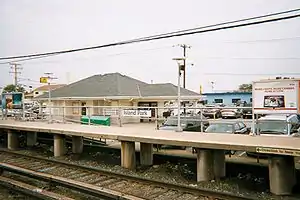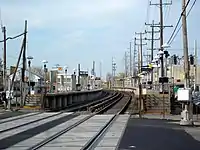Island Park station
Island Park is a station on the Long Island Rail Road's Long Beach Branch serving the residents of Island Park, Barnum Island, and Harbor Isle. It is the penultimate station on the branch. The station can platform a 12-car train and is fully wheelchair accessible with ramps from street level. Parking facilities are also available. Southwest of the station the train crosses over Reynolds Channel.
Island Park | |||||||||||
|---|---|---|---|---|---|---|---|---|---|---|---|
 Island Park Station house | |||||||||||
| Location | Long Beach Road & Austin Boulevard Island Park, New York | ||||||||||
| Coordinates | 40.600433°N 73.655388°W | ||||||||||
| Owned by | Long Island Rail Road | ||||||||||
| Platforms | 2 side platforms | ||||||||||
| Tracks | 2 | ||||||||||
| Connections | Nassau Inter-County Express: n15 | ||||||||||
| Construction | |||||||||||
| Parking | Yes[1] | ||||||||||
| Bicycle facilities | Yes[1] | ||||||||||
| Disabled access | Yes | ||||||||||
| Other information | |||||||||||
| Fare zone | 7[2] | ||||||||||
| History | |||||||||||
| Opened | 1898 (NY&LB) | ||||||||||
| Rebuilt | 1923 | ||||||||||
| Electrified | September 1910 750 V (DC) third rail | ||||||||||
| Previous names | The Dykes (1898 – 1924) | ||||||||||
| Passengers | |||||||||||
| 2012-14 | 3,062[3] | ||||||||||
| Services | |||||||||||
| |||||||||||
| Former services | |||||||||||
| |||||||||||
The station is located at the southern intersection of Long Beach Road and Austin Boulevard (Nassau County Routes 1A and 1, respectively), and is 23.7 miles (38.1 km) from Penn Station in Midtown Manhattan. The average commute time between Island Park and Penn Station is 45–50 minutes. The average commute time between Island Park and Jamaica is 25–30 minutes.
History

Island Park station was built as a signal stop by the New York and Long Beach Railroad in April 1898 as The Dykes and served as a flag stop during much of the early 20th Century. In 1922, developer Edgewater Smith changed the name of the island from Jekyl Island to Island Park, however the name of the station wasn't changed until 1924, the previous name that replaced the former Jekyl Island Station (see below) to the north.[4] The existing station building was built in May 1923.
Jekyl Island station
Jekyll Island station was originally built in 1901 as Barnum Island station on the south side of the northern Long Beach Road grade crossing[5] The station was renamed as Jekyl Island station in 1903, and then renamed "Island Park" station in October 1921. Due to an increase in development on the south side of the island,[6] the station was closed in July 1922[7] and the name was moved to the site of the old flag stop formerly known as "The Dykes." The site of the former Jekyl Island Station is now occupied by a residential cul-de-sac named D'Amato Drive, which is only accessible from Parente Lane North.[8]
Station layout
This station has two slightly offset high-level side platforms, each 10 cars long. Parking is largely restricted to Island Park residents, with permits issued by the village.[1]
References
- "Parking, Bus and Taxi Information - Island Park Station" (PDF). Long Island Rail Road. September 2019. Retrieved April 27, 2020.
- "New Fares — Effective April 21, 2019". Metropolitan Transportation Authority. Retrieved April 27, 2020.
- "2012-2014 LIRR Origin and Destination Report, Volume I: Travel Behavior Among All LIRR Passengers" (PDF). Abt SRBI. August 23, 2016. p. 204-207.
- "The Long Island Rail Road: A Comprehensive History Volume #5 (New York, Woodhaven & Rockaway Railroad; New York & Rockaway Beach railway; New York & Long Beach Railroad; New York & Rockaway railroad; Brooklyn rapid transit operation to Rockaway; Over L.I.R.R.)", by Vincent F. Seyfried
- Historic Map Works LLC. "Historic Map: Lynbrook, Rockaway East, Rockville Centre, Baldwin, Freeport, Ocean Shore, Atlas: Nassau County 1906 Long Island, New York - Historic Map Works, Residential Genealogy ™". historicmapworks.com.
- "Village History". Village of Island Park. Archived from the original on 2011-01-18. Retrieved 2012-06-29.
- "LONG ISLAND STATION HISTORY". trainsarefun.com. Archived from the original on 2017-05-26. Retrieved 2012-06-29.
- "40.603056,-73.656944 - Google Maps". google.com.
